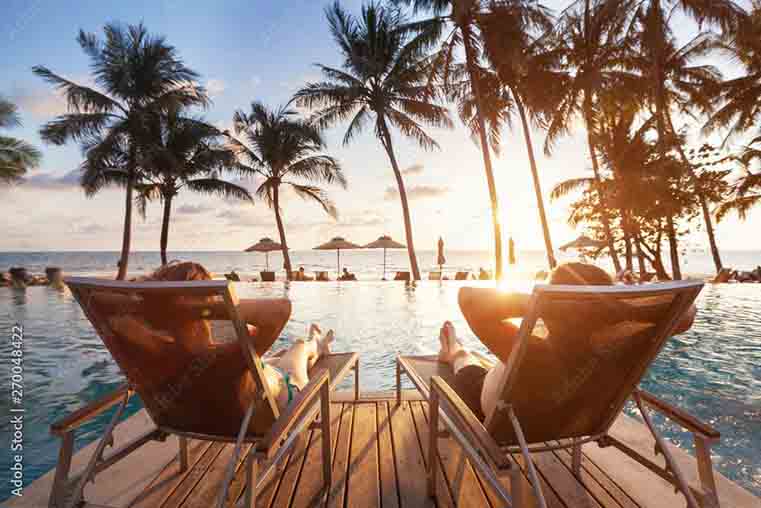The growing trend of luxury travel comes with a price that extends beyond the sumptuous accommodations and extravagant experiences. Every private jet flown and opulent cruise ship sailed contributes substantially to greenhouse gas emissions, exacerbating the global climate crisis. A single round-trip first-class flight can produce carbon emissions equivalent to that of several months of the average person’s driving. Many high-end resorts and exclusive tour operators capitalize on this allure, often overlooking the environmental toll associated with their offerings. as discerning travelers seek unique adventures—from helicopter rides over majestic landscapes to lavish safaris—it’s crucial to examine the hidden costs of thes indulgent pursuits.
Moreover, the luxury travel industry’s reliance on non-renewable resources further complicates the intersection of opulence and sustainability. The construction of sprawling resorts in pristine environments often leads to habitat destruction and increased pollution. Key factors contributing to this environmental impact include:
- High emissions from private air travel.
- Ample waste generated by luxury cruises and resorts.
- Extensive water usage in lavish accommodations, frequently enough in areas facing water scarcity.
- Increased demand for exclusive wildlife encounters, affecting local ecosystems.
An urgent dialogue is emerging around the duty of the luxury travel sector to adopt more enduring practices and embrace eco-conscious travel options, thereby aligning the desires of affluent travelers with the urgent needs of our planet.
Sustainable Alternatives: Reducing Emissions in High-end Travel
The travel industry is no stranger to innovation, and high-end travel is beginning to embrace sustainable alternatives that significantly reduce its carbon footprint. luxury consumers are increasingly prioritizing eco-friendliness, prompting hotels, airlines, and tour operators to adopt greener practices. As an exmaple, many luxury hotels now employ solar energy, rainwater harvesting systems, and organic, locally-sourced ingredients in their kitchens. Furthermore,the rise of eco-conscious travel agencies allows affluent tourists to curate bespoke itineraries that emphasize sustainability while still offering unparalleled experiences.These agencies frequently enough collaborate with certified eco-lodges and provide options for eco-pleasant transportation,such as hybrid vehicles or even electric yachts. Additionally,airlines are exploring innovative technologies to offset the emissions associated with long-haul flights. Several carriers are investing in sustainable aviation fuel (SAF) and committing to improve fuel efficiency through modern fleet upgrades. On the ground,luxury travel experiences can now include guided nature walks led by local conservationists,allowing travelers to engage with the environment meaningfully. Moreover, eco-luxury cruises are redefining maritime travel by using advanced waste management systems, minimizing single-use plastics, and ensuring wildlife protection.with these developments,the luxury travel sector is transforming the narrative of opulence,seamlessly integrating sustainability into its offerings without compromising on quality or service can be read exclusively on Harwichmayflower Project.
 The Role of the Travel industry in Combating Climate Change
The Role of the Travel industry in Combating Climate Change
The travel industry is at a critical crossroads, where its luxurious offerings often clash with the urgent need for sustainable practices. While high-end tourism can drive economic growth, it also contributes significantly to greenhouse gas emissions.From private jets that emit substantial carbon to lavish resorts that consume immense resources, the impact of luxury travel is undeniable. To mitigate this, the industry must adopt more sustainable methodologies, which can include:
- Investing in Renewable Energy: luxury hotels can transition to solar or wind energy, significantly lowering their carbon footprints.
- Promoting Eco-Friendly Practices: Encouraging guests to participate in sustainability initiatives,such as using less water and minimizing waste,can have a cumulative positive effect.
- Carbon Offsetting Programs: Partnering with organizations that plant trees or restore habitats can help counterbalance the emissions caused by travel.
Moreover, the travel industry can play a vital role in educating consumers about the environmental impact of their choices. By promoting alternative travel experiences that prioritize local culture and sustainability over mere extravagance, the industry can help foster a deeper appreciation for the world’s natural resources. implementing practices such as:
- Encouraging Slower Travel: Supporting journeys that emphasize immersion rather then rapid transit, thus reducing overall emissions.
- Partnering with Local Communities: Creating experiences that benefit local economies while preserving their environments can redefine luxury.
- Transparency Initiatives: Providing clear data about the carbon footprint associated with different travel options empowers consumers to make informed choices.
By taking these steps, the luxury sector of the travel industry can evolve from a contributor to climate change to a leader in sustainability efforts. The responsibility lies not only within travel companies but also with consumers who must demand and support environmentally conscious practices.

Navigating a Greener Future: Recommendations for Luxury Travelers
As luxury travelers become increasingly conscious of their impact on the environment, adopting sustainable practices can significantly reduce the carbon footprint associated with high-end travel. One effective way to initiate this change is by choosing eco-friendly accommodations that are committed to sustainability.Look for hotels and resorts that have received certifications from recognized environmental organizations, such as LEED or EarthCheck.Additionally, consider booking with those that prioritize local sourcing of materials and showcase an emphasis on energy efficiency. This not only supports the local economy but also minimizes the environmental impact of your stay.
luxury travelers can further enhance their commitment to a greener future by prioritizing sustainable transportation options.Whenever possible, opt for trains or electric vehicles, which are becoming increasingly available in some regions. If flying is unavoidable, consider airlines that offer carbon offset programs or invest in projects aimed at reducing emissions. Moreover, engage in local experiences that promote conservation, such as guided eco-tours or volunteer activities with environmental organizations. These choices not only reduce your carbon footprint but also enrich your travel experience by connecting you to the local culture and community.